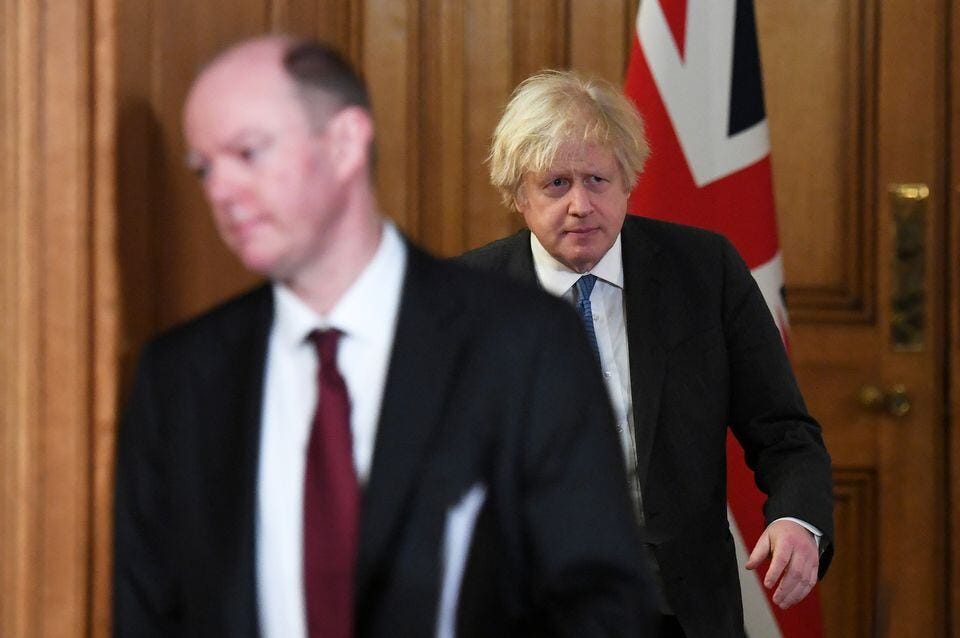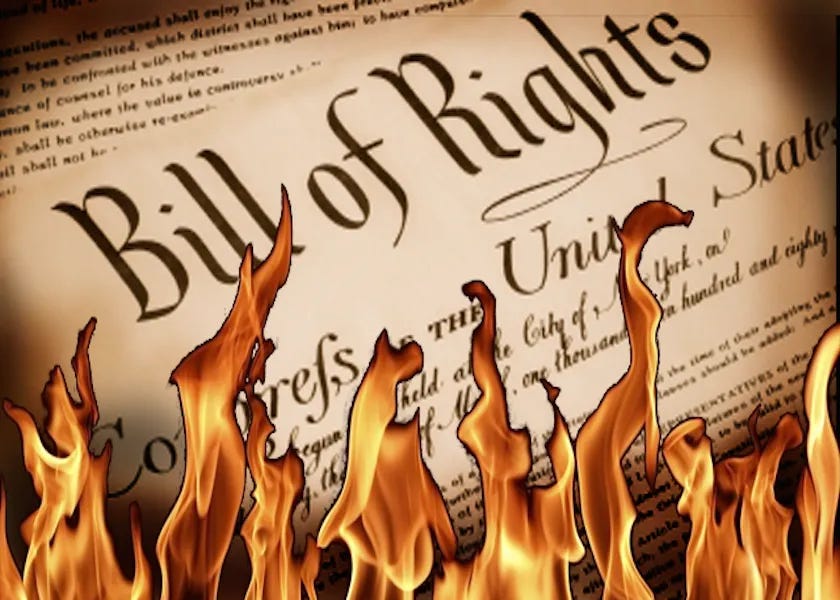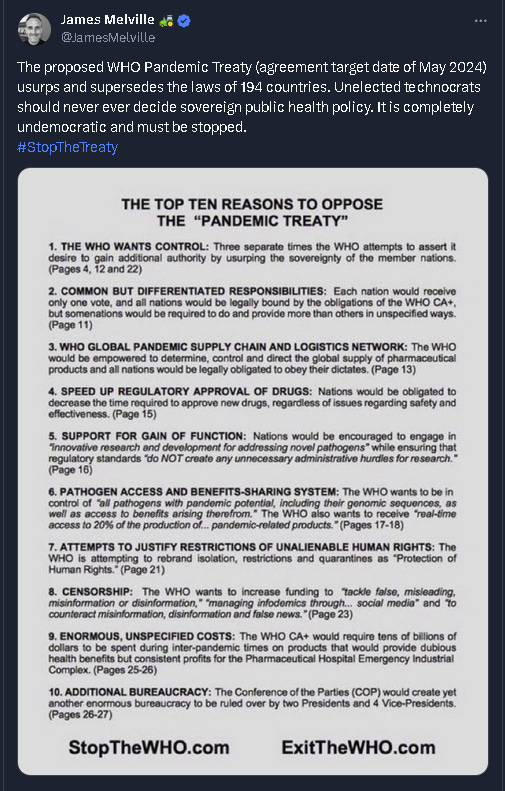The WHO Pandemic Treaty & IHR Amendments - An Alternative View
What has been misdirected and misplaced the most with Pandemic Treaty furore is ensuring the power grab by our own governments never happens again.
While campaigning against COVID certification and international border restrictions in early 2021, we turned our attention to the third edition of the International Health Regulations (2005), more commonly known as our current ‘pandemic treaty’. We believed, and petitioned those in authority, that they must uphold their legal international obligations to this multilateral agreement, and in doing so, it could affect the course of how states implemented COVID-19 restrictions at their borders.
What we quickly observed and came to understand, by the sheer lack of response as well as the continuance of the state-led measures that closed borders and coerced the public with useless non-pharmaceutical interventions (NPIs) such as digital health passes, was that ultimately, states were in control with their domestic legislation. To put it more bluntly, not only did they contravene various articles of this international agreement without fear of accountability, but they outright ignored it during a Public Health Emergency of International Concern (PHEIC). No treaty, agreement, accord, convention, or protocol stopped any government from flexing their sovereignty throughout COVID-19. Period. This was, and still is, a major clue about the balance of power and relationship between states and the health agency of the UN, better known as the World Health Organisation (WHO).
A perfect example to encapsulate the above was the United States' stubborn refusal to end international border restrictions on unvaccinated non-citizens and non-immigrants until May 2023. There was nothing that the WHO could do to make America rescind these decisions earlier and alongside the current IHR (2005)
But how did this all begin and where did the idea of a Pandemic Treaty come from? In February 2021, while the United Kingdom headed the G7, the former Prime Minister Boris Johnson and other select G7 members called for a new treaty to ensure ‘transparency’ in the wake of COVID-19. Johnson said, "I think what the world needs to see is a general agreement on how we track data surrounding zoonotic pandemics... and we want a joint agreement on transparency."
Three years on, we—the rest of the population—find ourselves in a chaotic state of information, still leading many people to believe that if a new accord and amendments to the IHR (2005) are ratified by all WHO member states during or after May 2024, sovereignty will be finished, Geneva will take control, the Director-General of the WHO will directly call the shots on governments with domestic health policies, and basically, we can kiss our freedom goodbye.
This particular train of thought was initiated by the so-called ‘WHO expert’ James Roguski, who said in March 2022 to ‘Wake up and smell the burning of our Constitution’. Not only is what Roguski said sensationalised verbiage, but it is emphatically untrue that a nation's sovereignty could be usurped by Geneva and can be easily deconstructed by most who are willing to commit a few minutes of time for basic research and investigation. Among many of his claims, Roguski previously said he discovered ‘secret hidden amendments’ between the WHO and the United States Dept. of Health and Human Services (HHS) on their proposed amendments to the IHR circa December 2021, when in fact this information was not secret nor hidden at all and available to legal scholars like Nithin Ramakrishnan. Researchers such as Susan T. Guest, certified in International (Treaty) Law, spent hours with Roguski over telephone conversations and emails attempting to straighten out core fundamentals within his erroneous output that quickly gathered pace and was amplified throughout social media, leading us to where we are today. How can any activist espouse to fight mal-information or misinformation when they themselves are implicated in such practices?.
Herein lies a significant problem. Not only has the majority of Pandemic Treaty commentary and opinion over the past two years been high in sensationalised and catastrophic language and low in critical thinking and rationale, it's also acted as a type of bait trap by the legacy media and governments, which will undoubtedly lead to further corporate and state censorship. Like us, if you’re a critical, more sceptical voice surrounding the subject of the Pandemic Treaty and IHR amendments, you’re almost immediately ostracised by the ‘truth community’ and deemed suspicious or accused of running cover for the WHO and the state or deliberately diluting conversation. All of which are petulant and childish accusations. Moreover, optics have dramatically shifted to the point where we’re dangerously forgetting about how our governments created and implemented disastrous COVID-19 restrictions using their own emergency powers regardless of a multilateral international agreement on global health. While some former COVID activists with large platforms and media attention claim to ‘get it’ about state responsibility and legal fundamentals, they continue to double down and drive that the WHO can and will ‘mandate’ governments in this ‘power grab’ with the ‘most dangerous treaty that the world has ever seen’. Whereas the danger to our civil liberties and fundamental rights, the actual power grab has been demonstrably at home and the track record of this throughout 2020-2022 is undeniable.
By definition the World Health Organisation is not a ‘supranational’ entity, although some activists continue to choose this fanciful adjective which is more fitting for the European Union where bloc members cede certain decision making powers through separate treaties to Brussels. A treaty is basically a formal promise that two parties (bilateral) or more (multilateral) undertake to form certain agreements whether it be trade, defence or health and these are made within the context of international law underpinned separately by the Vienna Conventions and Law of Treaties (1969). All treaties are not the same and all are not interpreted in countries domestic legislation. We must also not confuse the International Health Regulations with the 1951 UN Refugee Convention which for example is interpreted through the UK’s Immigration and Asylum Act (1999) and has caused much controversy alongside the Rwanda Bill.
Then there’s the confusion surrounding binding, legally binding, or bound. Terms which are synonymous, often used interchangeably and almost never unpacked by certain activists or legacy media commentators, which causes much confusion and concern. Most member states operate a dualist legal system whereby international agreements (treaties, protocols, conventions, et al.) are handled separately to domestic legislation. A legally binding international agreement or treaty ratified by states within international law does not mean that its text is immediately aligned or directly interpreted into the domestic laws of another country. If it were the case that states wanted to align or interpret treaty text into their own laws, separate parliamentary processes must occur, and that is where we have the real dogfight.
The World Health Organisation does not have the legislative authority to supersede domestic policies, usurp sovereignty, or enforce such agreements on members, and this has been the case throughout the existence of the IHR and its previous form as the International Sanitary Regulations (ISR), regardless of non-binding or binding text. But don’t take our word for it. Here’s what Dr Bruce Pardy, Law Professor at Queen's University, recently said to the Brownstone Institute:
”The threat from WHO proposals come not from outside but from within. We live in a managerial age, run by a technocratic elite. Over time, they have acquired for themselves the discretion to direct society for the common good, as they declare it to be.”
What we are more in agreement about now, and shared by Dr Pardy, is that in the event of another PHEIC which could bring about ‘Disease X’, governments may choose to offload responsibility to the WHO and cite Pandemic Treaty obligations. We use ‘may’ lightly here as we’re unable to predict what might happen within the next 10 years. But if they do use that old chestnut and attempt to offload or shirk responsibility, we categorically know that WHO member states can not only disregard treaty obligations without accountability, but they can also lawfully break these agreements in their courts, and this is certainly the case within the United Kingdom.
Another thing that Dr. Pardy alludes to in his Brownstone analysis is misinformation, while citing an ‘exasperated’ Tedros Adhanom Ghebreyesus on the issue of sovereignty.
“Ghebreyesus is correct. Local and national authorities will not give up their powers. To what extent international commitments will be “binding” on a country depends not on international law but on that country’s own domestic laws and courts”.
People may not agree with Dr Pardy nor us, but both Pardy and Ghebreyesus are correct. For over two years, the information sphere has been drowned out by wild and spurious claims where some have gone so far as to call the Pandemic Treaty and IHR amendments a ‘land grab’. Even legacy media have been at each other's throats, where German media outlet Deutsche Welle accused The Daily Telegraph in Britain of fake news. The irony. And the consequences of this, as we pointed out earlier, are more corporate and state censorship, more attacks on freedom of expression.
There are some who purport to be ‘freedom fighters’ within the so-called truth community who have cleverly adapted to the emotional release and outpouring over concerns about treaty negotiations so that it continues to elevate and gratify not only their personal egos but also media attention and financial status throughout the ‘attention economy’. It doesn’t matter to them whether they’re providing you half-truths or downright lies; your attention is their most precious and sought-after commodity.
As reported by multiple outlets throughout January, the new accord or Pandemic Treaty is struggling to reach the finish line for the 77th World Health Assembly set to begin on 27th May 2024. Deadlines have been missed, and lower-income or developing countries continue to hash it out regarding equity with developed nations. It’s also theorised that negotiations might fall apart and forming a new accord could be lost for years to come, leaving what could be only an update to the IHR (2005). Treaties can indeed take years to negotiate and should never be rushed. The biggest update to the IHR (1969) occurred in 2005, coming into effect in 2007 after SARS was no longer declared a PHEIC.
Even if the Pandemic Treaty fell apart, multiple countries opted out of IHR amendments, and some countries went so far as to leave the WHO, no doubt there would be a great sense of relief and celebration from many corners. But this is a false sense of security because, as we’ve been pointing out in this Substack and echoed by law professors such as Dr. Bruce Pardy, regardless of these international agreements, states retain unchecked emergency powers throughout their domestic legislation which could be executed again to severely curtail civil liberties and fundamental rights, and this was an absolute disaster throughout COVID-19, and its effects will continue to be felt for years to come.
To end on a more positive note, one of the best things to happen post COVID-19 is that there are a lot more people who are ‘awake’ and aware. Those who are determined never again to go back to those dark days of COVID-19 domestic and international restrictions. Those who are willing to simply ignore and resist global diktats. There are many well-intentioned people, well-intentioned activists who are deeply concerned about their future since COVID-19 and are trying to do something positive about it.
Having monitored and tracked what we've seen for over two years with the Pandemic Treaty and IHR furore, what has been greatly misdirected and misplaced the most is the attention we should be giving to our governments, their emergency power legislation, and how they conducted themselves throughout COVID-19, ensuring that they’re never allowed to conduct themselves in that way again.
The future is not set.
FOLLOW US:
Twitter / X: @org_scp
Telegram: t.me/org_scp









Thanks for your careful analysis. It echoes what I wrote last year: "So who has stolen our rights? The WHO or our own leaders? Could it be that focusing on what the WHO is or isn’t doing is distracting Americans from fixing problems within our own borders? Is there any danger in saying that the WHO has more power than it actually does possess? If people are given the impression that the WHO dictates U.S. pandemic restrictions can our governors and federal elected officials try to plausibly deny they are truly the ones who are to blame? The answers may unfortunately be yes. That isn’t to say that the WHO proposals should be brushed aside as meaningless. But instead of possibly exaggerating what the WHO negotiations are leading to, it is past time to hold our own leaders accountable and ensure that the errors of the last few years, enabled by our own overreaching emergency powers statutes, are not allowed to be repeated."